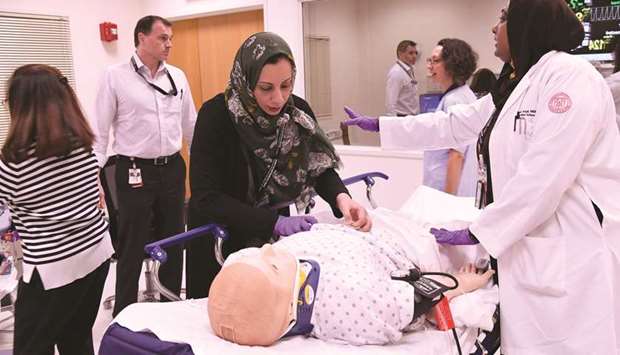Two leading experts in simulation-based learning visited Weill Cornell Medicine-Qatar (WCM-Q) to provide training in the latest methodologies and techniques in the discipline.
Course directors Dr Stefan Gisin, director of Simulation at University Hospital Basel in Switzerland and Dr Ralf Krage, director of the Amsterdam Simulation Centre at VU University Medical Centre Amsterdam, delivered the three-day EuSim Level 1 Simulation Instructor Course at WCM-Q’s Clinical Skills and Simulation Lab (CSSL).
The course imparted a wealth of specialist knowledge and skills to the participants, such as how to create safe learning environment, how to give instructive debriefing feedback after simulated learning exercises, using video to inform debriefing sessions and how to steer simulated scenarios to maximise learning outcomes, among other competencies.
Simulation-based learning is increasingly used in medical schools to give students the chance to gain a variety of essential skills by practising them in recreated real-world scenarios. Instructors utilise a range of techniques and tools to create these scenarios, ranging from low-tech methods like role-play with standardised patients to state-of-the-art medical manikins that can be programmed to exhibit a wide variety of symptoms.
Explaining the strengths of simulation-based learning, Dr Gisin said, “One of the key advantages is that we are able to replicate learning opportunities we do not have often enough in daily clinical work, for example rare diseases or very stressful or difficult situations where there is a great deal of time pressure and urgency. Similarly, simulation-based learning allows us to train in large, multi-disciplinary teams.”
The training course also demonstrated how to write and follow scripts for simulated scenarios, how to develop a simulation-based course, and how to act competently when playing a part in a role-play. The group of 16 participants who completed the course comprised physician educators, nursing educators, simulation-based learning specialists and a medical sociologist.
Dr Krage said, “The most important thing is to clearly define what are the learning goals that the instructor wants to teach. They also need to understand their target group and create clinical scenarios that are relevant for them. While the learning objectives must be clear, the instructor should not tell the learners what or what not to do but should observe and then create a discussion about what was learnt, how the participants felt about the experience and how they can improve.”
Joshua Vognsen, simulation education specialist, said, “Simulation-based education has expanded rapidly over the past twenty-plus years, challenging educators to become comfortable teaching using this relatively new modality. This course provided educators with an excellent opportunity to experience simulation from both the perspective of learner as well as educator.”
Dr Stella Major, associate professor of Family Medicine in Clinical Medicine, and director of the CSSL said, “This course was a continuation of our efforts to provide education for simulation educators in Qatar. With the inauguration of the annual symposium, the WCM-Q CSSL recognises the importance of investing in developing educators’ skillsets with the new experiential teaching modalities offered by simulation-based learning.”

A participant receives hands-on training.
